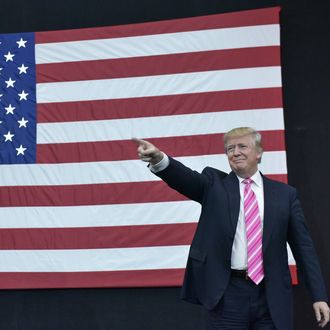
Earlier today, at an event hosted by Retired American Warriors PAC, a veterans’ political action committee, Donald Trump answered a question about faith-based programs for veterans at risk for suicide as a result of PTSD incurred during their military service:
In the lead-in to his response, Trump seemed to imply a divide between “strong” military personnel who get over the horrors of combat and, presumably, less strong ones who don’t: “When you talk about the mental-health problems when people come back from war and combat and they see things that maybe a lot of the folks in this room have seen many times over, and you’re strong and you can handle it — but a lot of people can’t handle it,” he said. “And they see horror stories, they see events that you couldn’t see in a movie, nobody would believe it.”
This is far from the most outrageous thing Trump has said during this campaign — it sounds like he was trying to compliment the audience and did so in a rather insensitive-sounding way. But it’s still important for people to understand that this is an outdated, harmful belief. There’s just no scientifically supported conception of PTSD in which “tough” or “strong” people are better able to overcome the disorder than “weak”ones. PTSD is extremely complicated — the best experts in the world aren’t sure why some people but not others develop symptoms after a traumatic experience, nor do they understand why PTSD symptoms remit in most cases while plaguing sufferers for long, anguishing periods in others, increasing their risk of suicide, divorce, and other terrible outcomes. In one emergency-room study, researchers recorded 68 different variables, ranging from the presence or absence of a concussion to the injured person’s social-support network, in an attempt to build an algorithm that could better predict who was at the highest risk of severe and unremitting PTSD symptoms after an accident. Myriad factors play a role, and there’s just no one simple story — at least not one that researchers have discovered yet.
In a military context, it’s particularly important for people not to fall for this myth. Talk to anyone who works on the issue of military PTSD and suicide, and they will tell you that sometimes the culture of the military, with its focus on toughness and stoicism, makes it harder for active-duty personnel and veterans to get the help they need. Sometimes, PTSD sufferers with a military background wrongly interpret their symptoms as a sign of weakness — and wrongly believe that seeking potentially life-saving help, whether by talking about their problems with buddies or finding a counselor at the V.A., will have the effect of broadcasting this weakness to the world. Unfortunately, that’s the damaging message that Trump just echoed.




